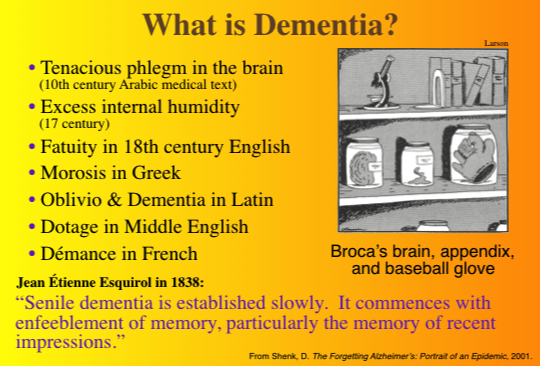Dementia. What is it?

Dementia Defined
The hallmark feature of Dementia is a deficit in short-term memory (STM). Most dementia patients can tell you who their elementary school teachers were, but they may have trouble remembering what you just said to them. In addition to a STM deficit, there must be at least one other cognitive problem:
There is a deficit in short-term memory:
• Learning and retaining new information
repeating self constantly, asking the same question repeatedly
Along with ≥ 1 deficit:
• Performing complex tasks (apraxia)
Problems with skilled tasks like cooking, confusion in dressing
• Reasoning & Judgment (executive function)
Makes mistakes in checkbook, concrete thinking (loss of abstraction) slowed thinking, comprehension difficulty
• Performing complex tasks (apraxia)
Problems with skilled tasks like cooking, confusion in dressing
• Reasoning & Judgment (executive function)
Makes mistakes in checkbook, concrete thinking (loss of abstraction) slowed thinking, comprehension difficulty
• Spatial organization & Orientation (agnosia)
Fails to recognize objects or people, getting lost in familiar places confused as to date, confused as to location
• Language (aphasia)
Word-finding problems, word substitutions
• Behavior/Personality Changes
Withdrawn, aggressive, suspicious
The course is gradual and declining
The short-term memory problem and the other cognitive deficit(s) must be severe enough to compromise the quality of life. This means that s/he can no longer perform some basic Activities of Daily Living (ADLs) like cooking, changing clothes regularly, or personal hygiene. Problems in ADLs often manifest themselves in family reports that the patient is more socially withdrawn, or has abandoned favorite activities like reading, knitting, or conversing with their spouse.
Is Dementia different from Alzheimer's?
Alzheimer's disease (AD) is one of many causes of dementia, but it is by far the most common cause. We address this later in this section. There is no X-ray, MRI or medical test for dementia. The changes that occur in the brain's cells (neurons) are so tiny that they can only be "definitely" diagnosed post mortem by examining a sample of brain tissue under very high magnification. There is no blood test to assess a person's word-finding problems, inability to learn or remember and/or use good judgement.
So How is it Tested for?
We rely on neuropsychological tests of short-term memory, language, reasoning and judgment (sometimes called "executive functions") and orientation. These tests are very accurate, most are more than 90% to 95% accurate in determining dementia or its precursor state–Mild Cognitive Impairment (MCI). We determine ADL levels by direct observation of patients (which is why home visits are so important) along with family interviews to evaluate behavior problems and/or deficits in ADLs.
What are the Right Terms?
For over twenty years we’ve used the terms Mild Cognitive Impairment (MCI) and dementia; however, in the last few years the diagnostic terminology has changed. We now refer to these conditions as a “Neurocognitive Disorder” or NCD. Respectively, they are now called Mild NCD and Major NCD. We may use the old terms now and then, but Mild and Major NCD are the correct diagnostic terminology used today.
Next Page –>